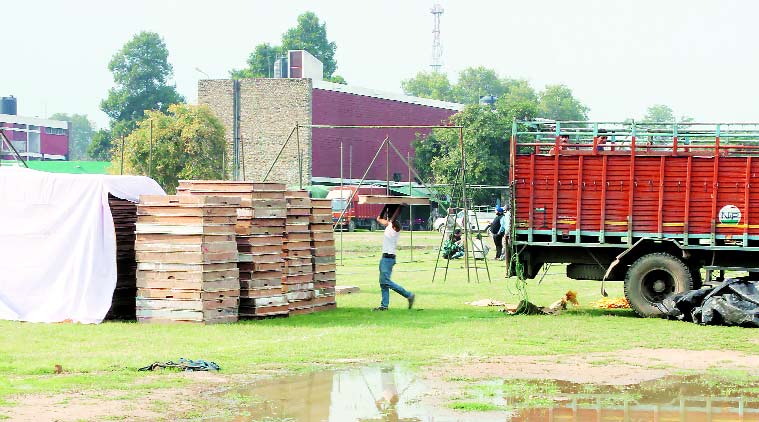Stay updated with the latest - Click here to follow us on Instagram
Cross pollination: PAU low seeded kinnow scores over Pak variety
Saplings are expected to be available by 2017 for farmers, said an official release from PAU.
 Panjab Agricultural University in Ludhiana. (Source: Express Photo by Gurmeet Singh)
Panjab Agricultural University in Ludhiana. (Source: Express Photo by Gurmeet Singh)
During the Panjab Agricultural University (PAU) board management meeting held on Monday, it was discussed that how the low seeded kinnow variety being developed by PAU is better in various technical aspects in comparison to the variety already developed by Pakistan.
It is to be noted that The Indian Express in its report published on September 1 last year had first highlighted that how fruit sciences department of varsity has kept four precious plants of low seeded kinnow (with 2-3 seeds) air-caged in the fruit research farm. After Pakistan and California varsities, PAU would only be the third varsity to develop low seeded kinnow variety.
PAU fruit scientist Dr H S Rattanpal, was working on seedless kinnow since 2006 and successfully developed tissue culture of four such saplings which were guarded in air cages to avoid any tampering but since PAU variety is better with least chances of cross pollination, the plants are now being multiplied without cages.
Saplings are expected to be available by 2017 for farmers, said an official release from PAU.
However, a point where Indian fruit will score over Pak breed is cross pollination. “The breed developed by Pak is affected by cross pollination but PAU fruit is resistant to it. It will be an advantage for us,” said a senior scientist from varsity.
The seedless kinnow- however also referred to as ‘low seeded kinnow’, with two to three seeds only (25-30 seeds normally) entered the citrus market after successful commercialization of plant in California few years ago and after that Pakistan in 2013 has too started sale of saplings after successful research in PPP mode (public-private partnership).
In India, PAU is the first institute to develop the fruit but is yet too far from commercialization and distribution of saplings to fruit growers.
Talking to The Indian Express, a senior scientist from PAU’s fruit science department, said, “We are almost three years late in developing low seeded kinnow but our variety is way better than Pak. The seeds in kinnow are major barrier while exporting fruit to European nations.
Currently the world export market of citrus fruits is worth $2.13 billion. Pakistan accounts for nearly 2.5% of kinnow export while India’s share is less than one percent. Pakistan since 2013 is selling low seeded kinnow saplings to farmers, almost 500 a day and their export is expected to grow to $1 billion as seedless kinnow orchards are fully shaped. Their plant has reached nurseries, ours is in research farm.”
However, Indian hopes are pinned on PAU variety after two harvest in 2013 and 2014 done after mutation breeding was through gamma rays gave successful rates and fruits had 2.-3 seeds only.
Nuclear Institute of Agriculture and Biology, Pakistan; Citrus Research Institute Sargodha; Pakistan Atomic Energy Commission and Sundar Agriculture and Fruit Farm- were participants in developing fruit through PPP (public-private partnership) in Pakistan.
A board member who attended meeting told Newsline, “The work of PAU was appreciated in meeting but saplings multiplication by 2017 is a challenge and we hoping for success.







